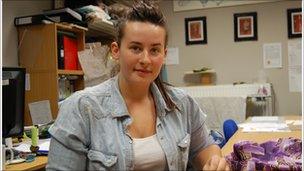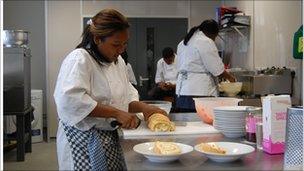Young, bright and able - but can't get a job
- Published

Rebecca says getting a job as a shop assistant is proving difficult in the current economic climate
Young people have been hit hard by the economic downturn.
Among the steady stream of people walking in and out of the Jobcentre on the corner of Kennington Park Road in south London is a smart young woman.
On the face of it, Liyana Solomon looks like she has the world at her feet.
Twelve months ago, the eloquent 22-year-old spent her time applying for graduate-level jobs in business development, but as time has passed she has lowered her aspirations.
She has recently been filling in applications for customer service roles and even made inquiries at her local coffee shop.
Now, Miss Solomon has been forced to sign on for the first time in her life.
"I've put it off for nearly a year now but I really, really need the money," she says.
"I'm such a proud person. I hate the idea of depending on the state for benefits."
Since the recession began, the number of unemployed recent graduates has doubled to 20%, according to the Office for National Statistics, external.
Graduate unemployment is now at its highest level in over a decade.
And it is not just university graduates who are finding it difficult to get work. More than one in five of all 16-24-year-olds is currently jobless.
The government's policy is to retrain unemployed people, both young and old, on courses provided by the private sector.
A4e is one such company and at its flagship centre in Brixton, around 100 youngsters currently attend classes to learn vocational skills including hairdressing and beauty, bricklaying and hospitality.
"The aim is to equip them with skills for entry level roles, for example in restaurants or in a hotel," says Denise Leander, the operations manager.
While Miss Leander admits they have yet to get anyone into such a job since the centre opened last June, she insists: "We have got a couple of young people who are waiting to move onto apprenticeships as a result of their experience here."
But a lack of qualifications and training is not something Miss Solomon has.

Nathan Morrison says despite applying for more than 100 jobs he has had only five interviews
She says she has been to more than 20 interviews since the new year and applied for countless other jobs.
"I've been looking for a job now for almost a year and it brings you down. It's all very, very stressful."
She insists she remains optimistic, citing a recent advert she has seen for a six-month internship at a medium-sized IT company, which she intends to apply for.
Miss Solomon knows that, at best, the internship would pay her lunch and travel expenses, but she believes it would be a foot in the door if she were lucky enough to get it.
"Sitting at home doing nothing is mind-numbing. I just want to work."
She plans to fund herself by getting jobseeker's allowance, but admits she is not sure that it will be allowed.
To get the benefits, she says she has been told she will have to sign on at the Jobcentre every two weeks and prove she is committed to getting a paid job.
"I think long term this internship could stand me in good stead to get a job I am qualified to do, but whether the system will actually fund me to do it is another thing."
Cutting back
Nathan Morrison, who is 21, has the added pressure of providing for his young child and partner, who recently lost her job.
The well-presented young man finished his IT diploma last summer and managed to find work straight away.
But he said he had to quit in December because the four-hour round-trip commute was too much of a strain.

Unemployed youngsters at A4e's centre in Brixton are able to learn how to run a hotel-style kitchen
Since then the young father reckons he has applied for more than 100 jobs.
"It's not only IT jobs I've been applying for. I've been looking at all types of work, including shop work.
"My strong point is my communication and personal skills but employers don't get to see that unless I get an interview. And I haven't been getting very many of them - maybe five since December."
Mr Morrison says making ends meet is a real struggle. He claims he has not had a night out in over a year because he simply cannot afford it, while "snacks and treats are strictly off limit".
It is difficult to imagine how the unemployed will not adversely be affected by the government's recent plan to close 22 Jobcentre Plus offices.
Ministers insisted the decision would not affect front-line services, but the PCS union condemned the move as "deeply flawed and dangerous".
Meanwhile, busy working away in A4e's fashion workshop is 17-year-old Rebecca, who is cutting material for one of her designs.
"I love fashion and retail, but I can't even get a job as a shop assistant," says the teenager.
"I've applied for around 100 jobs since the new year. Not many shops will take your CV anymore but I still walk in and ask them if they've got any work going, especially the smaller ones."
Rebecca says that once she turns 18, she is going to leave the country.
"I can't get a job here so I'm going to go to Greece to live and hopefully get a bar job out there for three months. I feel I need to get away and reboot myself."
She might not have much luck though, because Greece's unemployment rate is 16%, which is double that of the UK.
As an economics graduate, Miss Solomon understands the financial predicament the government is in with regard to bringing down the budget deficit.
She accepts it cannot afford to create thousands of public sector jobs to keep people like herself employed, but she does believe more could be done.
"The government should give firms money to help subsidise the cost of employing graduates like me, so that we can get the experience we so desperately need.
"Everyone says I've got the qualifications, I just need an opportunity to gain the work skills."
- Published13 May 2011